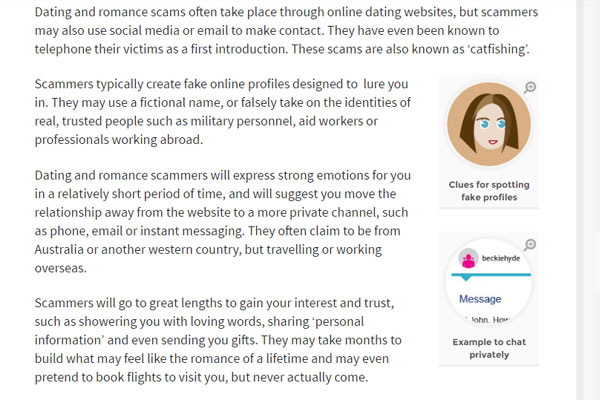Dating Scams
Dating scams - The black side of chatting

"Are you a professional or entrepreneur venturing into the world of online dating in search of a compatible partner?"
Navigating the vast ocean of the internet, many find solace in websites designed to bridge souls seeking companionship. However, like every rose with its thorns, alongside genuine profiles, there are digital predators known as online dating scammers aiming to hoodwink unsuspecting individuals.
These manipulators, commonly termed 'catfishers', master the art of crafting a façade of genuine affection, using eloquent romantic overtures to ensnare their targets. While countless people flock to dating platforms with the genuine intent of discovering love and forming deep connections, these swindlers twist these earnest desires into vulnerabilities, leveraging them to drain victims of their funds.
Through this discourse, our primary objective is to raise awareness about these shadowy catfishers and arm you with the knowledge to sidestep the snares of online dating deceptions.
Decoding the Strategies of Digital Romance Deceivers

"Online dating scams are not the work of lone wolves but rather a collective effort by well-orchestrated networks. These networks possess a clearly delineated structure, often complete with a leader, managerial staff, and foot soldiers. Their primary weapon of choice? The vast digital expanse of the internet.
The initial approach seems innocent enough, with a seemingly genuine individual expressing interest in you. These deceptive personas often craft intricate profiles, frequently masquerading as expatriates or non-resident Indians (NRIs). Portraying themselves as successful professionals in their respective fields, they weave compelling narratives to pique your empathy and build trust.
As the dialogue deepens, their intent becomes clear: to earn your trust while discreetly gauging your financial stance and garnering any relevant personal information. Once a bond is established, the requests begin. They might seek financial support for fabricated reasons, such as tuition fees, visa processing, or other administrative costs. In more audacious scenarios, another individual might intervene, posing as a medical professional, insisting on immediate funds for the urgent treatment or surgery of your newfound digital confidante.
According to the Federal Bureau of Investigation (FBI), countless victims across the globe have been ensnared in this web of deceit, with some experiencing financial setbacks to the tune of $400,000 due to these deceptive online romance schemes."
Preying on the Emotionally Susceptible

The Underbelly of Online Connections
The internet has transformed the way we connect, fostering deep relationships even from distances. However, it's essential to tread cautiously. Malicious scammers often prey on those emotionally vulnerable, such as the recently divorced, widowed, or people with disabilities, especially if they are financially stable. Understanding that these individuals might be emotionally tender, and in search of genuine affection and comfort, these deceivers craft narratives where they too pose as widowed or recently divorced, exploiting the trust and compassion that their stories evoke.
Spotting the Online Romantic Deceivers:
Shielding oneself from these cunning predators involves being observant and noting red flags. Here's what you should watch out for
- Perfection Personified: If someone seems impeccably perfect, they might be hiding behind a fabricated persona.
- Rapid Relationship Progression: Scammers often push the pace, wanting to move the relationship to more intimate stages unusually quickly.
- Elusive about Face-to-Face Interaction: If they're always dodging video chats or in-person meetings with myriad excuses, be cautious.
- Story Inconsistencies: Muddled details or changing narratives can be warning signs.
- Emotionally Manipulative Tales: Their stories often play on emotions, intending to exploit your sympathies.
- Financial Aid Requests: Regardless of the rapport, any requests for monetary assistance should be met with suspicion.
- Language Barriers: Frequent grammatical and spelling mistakes might hint at their true origins or intentions.
- Overemphasis on Finances: If they're overly curious about your financial standing or possessions, take heed.
- Personal Inquisition: An excessive interest in your personal data might indicate ulterior motives.
- Questionable Web Links: Avoid clicking on links from untrusted sources; they might be phishing schemes.
Safe online dating involves maintaining skepticism, even in the face of budding romance. Should you feel you're being ensnared by a deceiver, cut ties and report any suspicious profiles.
Armoring Against Romantic Online Schemes
- Resist sharing sensitive personal details on public platforms.
- Engage in chats with unfamiliar people cautiously, ensuring financial or other significant details remain private.
- Stay guarded if emotions seem to be manipulated. If something feels off, it probably is.
- Transferring funds without thorough checks is a risk. Always be skeptical of any monetary pleas.
- If someone's demands escalate to threats, do not hesitate to involve law enforcement.